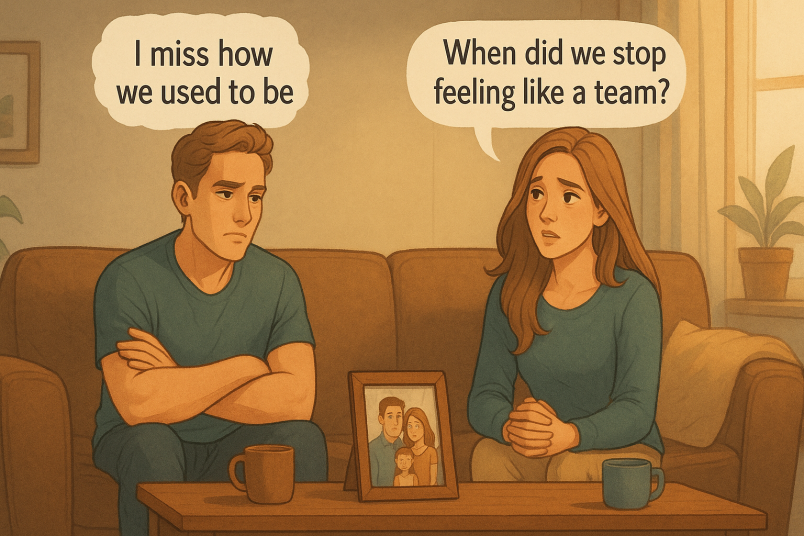13 Signs of a Bad Marriage (& How to Fix It)

Unlock Daily 30-Sec Tips for a Happier Relationship
👉 Subscribe FREEKey Takeaways
Marriage.com AI Quick Summary
Emma stares at the quiet dinner table… again. The clinking of cutlery has been replaced by silence; the kind that hums with words left unsaid. John scrolls on his phone, pretending not to notice her distant eyes.
Once, they used to laugh about everything—now even small things spark irritation. “I’m just tired,” he says, and she nods, though her heart feels heavier than fatigue.
When warmth fades into routine, and communication feels like walking on eggshells, something’s off. These subtle moments—distance, defensiveness, and constant tension—often whisper the early signs of a bad marriage, long before anyone says, “We’re not okay.”
Why marriages sometimes fall apart
Sometimes, marriages fall apart not because of one big mistake but because of small, repeated moments of disconnection—missed conversations, unspoken hurts, and fading appreciation.
Over time, love can get buried under stress, unmet needs, or emotional distance. When partners stop feeling heard or valued, even simple things start to feel heavy, and the warmth that once came naturally begins to fade—these are often the quiet signs of a bad marriage.
A research paper published in 2001 states that among newly married couples, about 67% of women who became mothers reported declines in marital satisfaction after their baby’s arrival, while 33% reported stable or improved satisfaction.
Example: Take Emma and Ryan They didn’t have explosive fights—just growing silence. She stopped sharing her worries; he stopped asking about her day. Slowly, they began to live parallel lives instead of a shared one. It wasn’t one argument that created a bad marriage—it was the absence of connection.
Please note:
Still, it’s never too late to rebuild. With openness, empathy, and small, consistent efforts, couples can rediscover the closeness they once had. Healing begins not with blame but with the simple act of choosing to try again.
13 signs of a bad marriage
A bad marriage doesn’t always start with shouting or distance—it often begins with quiet disconnection, unmet needs, or fading warmth. Over time, love feels replaced by tension, loneliness, or indifference, revealing the subtle yet painful signs of a bad marriage that couples often overlook until it’s too late.
1. Communication breakdown
One of the primary warning signs of a failing marriage is a breakdown in communication.
When partners no longer engage in meaningful conversations, misunderstandings and resentments can fester. This lack of communication leads to a sense of isolation and disconnection within the relationship.
- Example: Emma tries to share her day, but John simply nods without listening—soon, she stops trying altogether.
2. Frequent conflicts
Another indicator is the escalation of conflicts. Disagreements are normal in any relationship, but when they become frequent and more intense, they can signify deeper issues. These conflicts often arise from unresolved problems and can erode the foundation of the marriage.
- Example: A small comment about chores quickly turns into a heated argument about “everything that’s wrong” in the relationship.
3. Loss of intimacy
A noticeable decline in physical and emotional intimacy is a clear sign of a loveless and unhappy marriage. Intimacy is the glue that binds partners together, and its absence can lead to feelings of neglect and unimportance.
- Example: They share the same bed but rarely touch, talk, or even say goodnight anymore.
4. Infidelity
Infidelity, whether emotional or physical, is a significant red flag.
A research paper published in the International Journal of Environmental Research and Public Health states that romantic infidelity—not just physical, but emotional and online—can dramatically damage relationships, lowering well-being and often leading to separation.
It breaks the trust fundamental to a marriage and often indicates deeper dissatisfaction within the relationship.
- Example: One partner begins confiding in a coworker instead of their spouse, seeking emotional comfort elsewhere.
5. Lack of respect
One of the warning signs of a failing marriage is the lack of honesty between the couple. Respect is a cornerstone of any healthy relationship. When partners no longer show respect to each other, whether through words or actions, it’s a sign of a deteriorating marriage.
- Example: They interrupt each other constantly, mock each other’s opinions, or dismiss feelings as “overreactions.”
6. Financial dishonesty
When you are looking at the signs of a bad marriage, assess the level of financial transparency that is maintained between the couple.Financial dishonesty or secrecy can create a significant rift between partners. It often leads to mistrust and can be a symptom of deeper issues in the marriage.
- Example: One partner hides new purchases or debts, fearing judgment or confrontation.
7. Avoiding time together
When partners start to avoid spending time together, it indicates a marriage going bad. This avoidance is often a defense mechanism to reduce conflicts or feelings of disappointment.
- Example: Instead of watching a movie together, one partner always finds an excuse to work late or go out with friends.
8. Different life goals
Diverging life goals and values can drive a wedge between partners. When couples no longer share common objectives or visions for the future, it undermines the unity essential for a marriage.
- Example: One dreams of moving abroad, while the other wants to settle near family—neither feels heard.
9. Constant criticism
Constant criticism, especially when it lacks constructiveness, can be damaging. It reflects a bad marriage relationship and often leads to a toxic environment where partners feel undervalued and unloved.
- Example: One dreams of moving abroad, while the other wants to settle near family—neither feels heard.
10. Feeling trapped
A sense of entrapment or hopelessness is one of the severe signs of a unhappy & loveless marriage. When one or both partners feel trapped in the marriage, it’s indicative of deep unhappiness and dissatisfaction.
- Example: They stay together only “for the kids” or fear being alone, even though the bond is long gone.
11. Thoughts of divorce
Frequent thoughts of divorce or ending the marriage are the most apparent signs of a bad marriage or relationship. When the idea of being apart seems more appealing than staying together, it signifies a profound disconnect in the relationship.
- Example: One partner quietly imagines a life without the other—and feels relief instead of sadness.
12. Emotional withdrawal
When one or both partners emotionally shut down, it becomes difficult to connect on any meaningful level. Conversations feel surface-level, and emotional needs go unnoticed, leaving one or both people feeling invisible.
- Example: When Sarah expresses feeling lonely, David responds with silence or changes the topic, avoiding any emotional depth.
13. Lack of support
A healthy marriage thrives on mutual encouragement and empathy. When partners stop showing interest in each other’s goals, struggles, or successes, it reflects emotional detachment and declining partnership.
- Example: When Emma shares her promotion news, John barely reacts, making her feel unsupported and alone in her achievements.
How to fix a bad marriage: 9 tips
Not every rough patch means the end—sometimes, recognizing the signs of a bad marriage is the first step toward healing.
When distance, silence, or frustration start to appear—the signs of a failing marriage—it’s possible to rebuild connection with empathy, effort, and a renewed commitment to understanding each other.
1. Recognize the signs of a bad marriage
The first step in addressing issues in your marriage is to acknowledge the problems.
Signs of a bad marriage often include persistent unhappiness, lack of communication, constant conflict, emotional or physical abuse, and a lack of mutual respect or trust. If you’re experiencing these issues, it’s important to take them seriously.
- Quick Tip: Take note of recurring patterns—journaling your thoughts or feelings can help identify triggers and recurring issues clearly.
2. Communicate openly and honestly
Open and honest communication is key to resolving conflicts and understanding each other’s perspectives. Approach conversations with empathy, listen actively, and express your feelings and concerns without blame or judgment.
- Quick Tip: Use “I feel” statements instead of “You always” or “You never” to express emotions without sounding accusatory.
3. Seek professional help
Sometimes, the guidance of a therapist or counselor can provide valuable insights and strategies to improve your marriage. Couples therapy can help you understand the root causes of your problems and work through them constructively.
- Quick Tip: Don’t wait for a crisis—therapy can be preventive, not just corrective. A neutral third party helps both partners feel heard
4. Set boundaries and respect them
If you see the signs of a marriage going bad, it would serve you well to set and maintain healthy boundaries.
Establishing and respecting personal boundaries is crucial for a healthy relationship. This includes physical, emotional, and digital boundaries. Clear boundaries help prevent resentment and misunderstandings.
- Quick Tip: Clearly communicate your limits—say “I need a few minutes to cool down” instead of walking away silently.
5. Spend quality time together
Rekindling the connection you once had can be as simple as spending quality time together. Engage in activities you both enjoy, have regular date nights, or simply set aside time to talk and reconnect.
- Quick Tip: Turn off devices during shared time—undivided attention can do wonders for emotional closeness.
6. Address individual issues
Sometimes, individual problems such as stress, mental health issues, or past traumas can spill over into your marriage. Working on your personal issues can have a positive impact on your relationship.
- Quick Tip: Prioritize self-care—therapy, meditation, or journaling can help you show up as your best self in the relationship.
7. Focus on rebuilding trust
Trust is the foundation of a strong marriage. If trust has been broken, work on rebuilding it through consistent, reliable behavior and open communication. This process takes time and patience.
- Quick Tip: Be transparent with your words and actions—small acts of honesty rebuild confidence faster than grand gestures.
Watch this TED Talk by Frances Frei, a Harvard Business School professor, who shares how trust is built and rebuilt through three essentials: authenticity, logic, and empathy.
8. Consider your children’s perspective
If you have children, consider the impact of your marital issues on them. Ensure they have a supportive and stable environment, and be mindful of how your actions and decisions affect them.
- Quick Tip: Keep adult conflicts private—children need reassurance, not exposure to tension or blame.
9. Know when to let go
In some cases, the best solution for signs of a bad marriage may be to part ways. If the relationship is unhealthy or if efforts to improve the situation have been unsuccessful, it might be healthier for both parties to move on separately.
- Quick Tip: Letting go doesn’t mean failure—it can be an act of self-respect and a step toward personal peace and healing.
FAQs
Every relationship faces challenges, but knowing what’s really happening can make all the difference. These quick answers address common questions about recognizing and repairing a bad marriage with care and awareness.
-
What are the early signs of a bad marriage?
Early signs of a bad marriage include emotional distance, frequent arguments, and a lack of trust or respect. Small issues left unresolved often grow into deeper disconnection over time.
-
Can a bad marriage be fixed once it’s falling apart?
Yes, even when you notice the signs of a failing marriage, healing is possible. Honest communication, empathy, and sometimes professional help can rebuild understanding and closeness between partners.
-
How do I know if my marriage is beyond repair?
When both partners feel emotionally exhausted, unwilling to try, or unsafe, it may signal that the bad marriage has reached its breaking point. In such cases, separation might bring peace and growth.
Finding your way forward
Every relationship goes through rough patches, but a bad marriage doesn’t have to stay that way. Recognizing the signs of a failing marriage is the first step toward healing, growth, and reconnection.
Whether you choose to rebuild together or part ways with respect, what matters most is choosing honesty, care, and emotional well-being—for yourself and your partner. With patience and willingness, even broken bonds can lead to stronger beginnings.
 Tips
Tips
Write your tip or submit a video tip
All tips are reviewed before the publishing.
Share this article on
Want to have a happier, healthier marriage?
If you feel disconnected or frustrated about the state of your marriage but want to avoid separation and/or divorce, the marriage.com course meant for married couples is an excellent resource to help you overcome the most challenging aspects of being married.
Recent Articles
Related Quizzes
Unlock Daily 30-Sec Tips for a Happier, Healthier Relationship
👉 Subscribe FREE on YouTube We'd love your feedback!
We'd love your feedback!
 Expert Q&A
Expert Q&A
Ask your question related to this topic & get the support you deserve from experts.



















 Thanks for your feedback!
Thanks for your feedback!